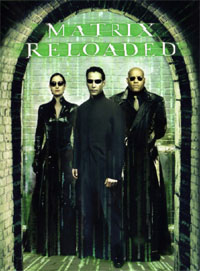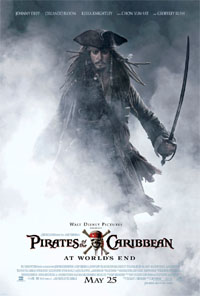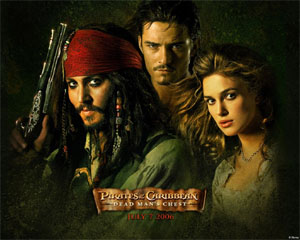I have just now returned from seeing Pirates of the Caribbean: At World’s End for the second time. I am struck by how similar my reaction to the Pirates of the Caribbean trilogy is to my reaction to The Matrix Trilogy, and how dissimilar my reaction was compared to other people.
THE SHORT VERSION: In both cases, of course, I thought the first films were fantastic. I’m sure there are some who may disagree, but for me both were high-water marks among my cinematic experiences. Both movies were pure fun. With both movies, I left the theater with a giant grin spread across my face.
 SECOND FILM: I was shocked to discover, after ecstatically watching The Matrix Reloaded at a midnight showing, to discover that a large number of people hadn’t liked the film. And I was equally shocked, after watching Dead Man’s Chest, to discover the same thing. (I’m even more puzzled, in the latter case, by people who say they prefer At World’s End to Dead Man’s Chest.)
SECOND FILM: I was shocked to discover, after ecstatically watching The Matrix Reloaded at a midnight showing, to discover that a large number of people hadn’t liked the film. And I was equally shocked, after watching Dead Man’s Chest, to discover the same thing. (I’m even more puzzled, in the latter case, by people who say they prefer At World’s End to Dead Man’s Chest.)
For me, the success of both The Matrix Reloaded and Dead Man’s Chest lay on two pillars:
First, the films expanded the breadth and depth of the mythology. I loved learning about rebellious programs like the Merovingian, fragmented remnants of previous iterations of the Matrix, the Architect, and the true purpose of the Prophecy. I loved Davy Jones and the revelation of Jack’s bargain.
Second, the films delivered some really fantastic action sequences. For The Matrix Reloaded, the piece de resistance was undoubtedly the car chase sequence. For Dead Man’s Chest, it was the brilliantly counter-pointed swordfight at the end — with Jack, Will, and Norrington fighting in the waterwheel while Elizabeth and the two pirates had to share just two swords between the three of them.
Ironically, these are both things which I have heard other strongly criticize, much to my confusion. For example, I’ve heard a surprising number of people complain about “all the kung fu” in The Matrix Reloaded because, in their opinion, the end of the first movie suggested that Neo should have moved beyond the need for physical combat. (These are people who have, essentially, pre-written the sequel they wanted and, when the filmmakers didn’t miraculously read their minds and deliver that film, they were disappointed.)
Similarly, a lot of the people who dislike Dead Man’s Chest talk about how the movie was “suddenly” filled with magical ships and mythological creatures. At least some of these complainants have the self-awareness to realize this sounds a trifle odd when the first film featured undead pirates and gold cursed by Aztec gods, but they justify their complaint because, essentially, they’ll accept one magical departure from our world, but not two.
This bugs me because, essentially, they’re saying that all they wanted the sequel to do was redo the first film while shuffling the pieces around. I’ve never understood that approach to sequel-making and I’ve been very glad to see Hollywood moving away from it recent years: If I just wanted to re-watch the first film, I’d pop the DVD in and watch it. With a sequel I want to see familiar characters in a tale told along the same vein, but I want something new. I want the new film to take me places the old film didn’t.
And, for me, The Matrix Reloaded and Dead Man’s Chest both delivered that.
 THIRD FILM: But what really draws a parallel between the two trilogies in my mind is not their successes, but their shared failure. For me, in both cases, the sequels were fantastic… right up to their conclusions.
THIRD FILM: But what really draws a parallel between the two trilogies in my mind is not their successes, but their shared failure. For me, in both cases, the sequels were fantastic… right up to their conclusions.
In the case of The Matrix Revolutions, I felt that the Wachowski brothers put the entire dramatic weight of the trilogy onto Hugo Weaving’s shoulders and said, “Okay, this monologue is the culmination of the entire trilogy. Land it like Keri Strug and we can all go home.” And then, much to my surprise, Hugo Weaving blew it. Maybe the script contributed, and certainly the editing didn’t do much to help. But, ultimately, I felt the moment, the necessary elements were there, and yet… they didn’t quite carry it off, for reasons I can’t quite put my thumb on.
In the case of At World’s End, the problem can be much more succinctly targeted: The entire plot of the movie was centered around getting all the pirates in the world together so that they could fight back against the armada of the East India Company. And they get all the pirates in the world together. And what do all the pirates in the world do? Absolutely nothing. And what does the armada do? Absolutely nothing. The film then compounds the problem by having Cutler Beckett act completely out of character not once, but twice: First by putting himself in danger (when he literally has an entire fleet of flunkies he could send to finish off the Black Pearl) and then again when he suddenly seizes up at a moment of crisis (despite the fact that we’ve seen him act cool and collected under pressure on countless occasions).
(My suspicion is that the writers and director originally intended to give us a huge sea battle between the armada and the pirate fleet, but they ran out of both time and money: The film was nearly 3 hours long and cost $300 million to produce even without the sea battle. Both those figures would have only ended up being even larger if a 10-15 minute sea battle, with all the requisite special effects, had been filmed.)
IN CONCLUSION: I have no grand statement or conclusion to draw from all this. I’m simply struck by the way in which both of these trilogies ended up, to at least some extent, squandering what could have been a triumphant crescendo on lackluster endings that didn’t quite close the deal.
Of course, endings are not always an easy thing to carry off. Look at Neal Stephenson, for example.
But, on the other hand, look at Terry Pratchett. Pratchett consistently delivers endings which are not only satisfying, but frequently elevate the entire work to a new level.













